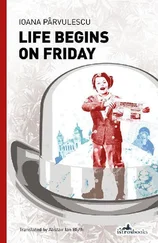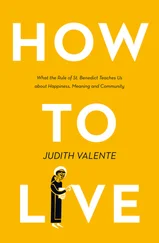She gets on her bike and turns left into Forest Lane. Crossing Main Street at the big intersection, she loses the stranger’s trail, if there even was one. She rides past the shopping centre, across the car park with the shopping centre’s flapping banners and clanking flag chains, a wild noise that Ava loves. She turns into the new development. Large, free-standing one-family houses, with families sitting on the terraces as if posed there, defying the chilly May wind. Dogs throw themselves against garden gates and are generously whistled back. Stella rides down Pine Lane, Stone Pine Lane and Fir Tree Lane to the middle of the development. She takes this route every day. Ava’s kindergarten, a park and the office of the nursing station in the Community Centre are all located in the middle of the development. She isn’t paying attention. Not concentrating, isn’t being careful. She’s glad when she can park the bike in front of the Community Centre. The door is wide open; a breeze is blowing through the foyer where small reading lamps are lit on little tables at which no one ever sits. Stella often arrives at the office half an hour before her shift starts; she almost always has a cup of coffee with Paloma. Paloma is fifty, tall and gaunt; her expression is disdainful and at the same time melancholy. Occasionally she baby-sits for Ava; she’s curious but not too curious; there are days when Stella discusses Ava with Paloma; sometimes they talk about Jason too, and if not about Jason, then occasionally about Stella’s dreams, about her uneasiness that could be caused by the weather or something else. Paloma has a penchant for Swedish crime novels. She almost always wears black dresses and ethnic necklaces. She looks like an actress in a silent film, but maybe, Stella thinks, that’s because Paloma is often on the phone while handing out keys, pushing weekly schedules across her desk, and making signals with her hands and eyes, signals that Stella could interpret one way or another or yet in some completely different way. This afternoon Paloma is on the phone to her mother, maybe to her mother. She is often interrupted by the other person; this is unusual, and her voice alternates between annoyance and forbearance.
Yes. No. I can’t keep telling you the same thing all the time. You don’t challenge yourself enough. You have to move around more, you have to change your habits. Put on a hat and go outside.
Stella steps behind the desk, takes Esther’s key off the hook, signs the week’s schedule, which is already full of scrawled notes of changes and substitutions. She would like to wait till Paloma finishes her conversation. She would like to say to Paloma, Just imagine, a stranger rang our doorbell today. He said he’d like to speak to me, but I don’t know him at all. I’ve never seen him before.
How would that sound?
It wouldn’t sound normal.
But still, she could say it that way, blush and then laugh about it, and maybe with the laugh this unpleasant feeling would go away — uneasiness, anxiety, as if she had overlooked something. She steps to the front of the desk.
Just for once, stick to the arrangement, Paloma is saying. She holds the receiver away from her ear, and putting her hand over the mouthpiece and rolling her eyes up towards the ceiling, she whispers, Good Lord.
Till later, Stella mouths soundlessly. She points at the clock, holds out four fingers. She leaves the office, passing the empty tables, the display cases in which there are pictures by the schoolchildren held in place by colourful magnets: giant suns, smiling flowers, children from all the continents holding hands. She says hello to the janitor. She buttons up her rain jacket, walks out of the foyer.
*
Esther is eighty-two years old. She isn’t Stella’s favourite patient, but not unbearable either. It’s best not to have favourites among the patients. Even so, Stella likes Dermot best, Julia’s husband. Esther is lying in bed. Actually, she still gets up every afternoon and walks from her bedroom into the living room or the kitchen. But for the last few weeks she’s just wanted to lie in bed, dozing, maybe eat a piece of buttered toast with a little orange marmalade, drink some tea with it, and have Stella open the window every two minutes and then close it again. Not in a good mood today, the carer doing the night shift had written into the record book. Esther’s bedroom is small. Her bed stands in front of a wall of bookshelves; when Esther lies on her side she’ll grab a book from the shelf at random, open it, read a sentence aloud, shake her head at what she’s read and drop the book behind the bed. The little night table is full of medications, pill dispensers, water glasses, various watches, glasses, thermometers and first-aid kits. Esther’s skin is parchment-thin and wrinkled; it tears like paper. The room smells of old age and illness, but of something else too. Of incense and myrrh, Esther’s cigars, dusty books, and the flowers on which Esther insists and which stand around in large glass vases. The window is open, the radio is on, with a lackadaisical, sleepy lecture that sounds like a lot of drivel to Stella, about something imaginary, a lot of drivel from the world of shadows. Now finally, in taking care of Esther, she emerges from those other thoughts into the familiar rhythm of touching, sick-room procedures, responsibilities, the counting of drops, emptying of tubes, pots, pails, Esther’s spit cup, the glass for her teeth, the bowl for the warm soapy water. Don’t be so lazy, Esther, try to help a little. And Esther pulls herself up by means of the handle that’s part of the apparatus rigged up over her bed, sitting up and dangling her legs over the edge of the bed with the same expression Ava sometimes has, sullen, restrained, pretending to be far away.
Esther says, My feet are cold, please close the window; turn off the radio now; put on my socks; I want those soft socks Ricarda knits for me. Ricarda is Esther’s daughter, and Stella can’t remember any more when she last saw her here. Esther’s eyeballs are red-veined; the irises are a bright, profound blue. Seven drops into the left eye, seven drops into the right. Her blood pressure has dropped through the floor. Last night, though, it was one hundred and eighty. What caused that, Esther? Sometimes they can joke with each other, find a common language, common ground, two people forced to touch each other, to handle each other, to share information. It could just as well be the other way around. It could be Esther who swaddles Stella. The present arrangement is a coincidence, nothing more. Do you have a fever? Come, Esther, lift up your arm and hold the thermometer. You feel quite hot.
Esther says, Nonsense.
Stella squeezes a drop of blood from her earlobe, measures the blood sugar level, enters Esther’s catastrophic numbers on the chart in the record book, as if they weren’t catastrophic. She calculates and counts out drops and pills, and all that time Esther keeps talking to herself, jumping from one subject to another, from a long-ago year into the here and now, from a suspicion to a fragile memory, from the memory to the stubborn pain flaring up in her back or in her eyes or in her chest, her knee, the joints of her fingers, her head, her behind, her back.
Don’t be so rough, Stella. What are you thinking of? Don’t keep frowning all the time. You’ll look like an angry parrot when you get old.
Esther giggles.
Stella washes Esther’s face. She washes Esther’s hands, her back, her armpits, her private parts. Esther’s feet; Esther is very proud of her feet; they’re the only part of her body that seem unscathed, the slender feet of a dancer.
Are you hungry?
No.
Esther doesn’t want to eat anything, but she claims that the bread for toast is all gone; Stella should go shopping; Stella finds enough toasting bread in Esther’s kitchen to last for months, goes shopping anyway. In the supermarket she stands leaning against the newspaper rack, reading the week’s horoscope; she’s tired; the in-store music has something sad about it. To Stella it seems as if the lights were being turned out in slow motion.
Читать дальше












